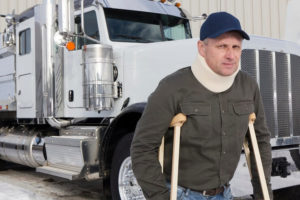The Graves Amendment in Moving Truck Accident Cases

Every year, thousands and thousands of Americans hit the road in search of new environments and new opportunities. Some may choose to cram their sedans or load their pickups, while others opt for a more traditional staple: the moving truck. Companies like U-Haul, Penske, and others let movers roll off their lots everyday in trucks that are commercial-sized, and most drivers usually have no experience operating a vehicle of that magnitude. Not to mention, they are usually headed to a location they are not familiar with. As you can imagine, there are liability risks all over the place.
Now, under normal civilian circumstances, allowing someone to drive your vehicle when they are untrained or not properly licensed could be considered to be negligent entrustment. Most states have some form of negligent entrustment laws, meaning that if you entrust somebody with a vehicle or object (such as a gun) they are not fit to operate in the first place, you may be held liable for the damages they cause. The reason why these laws don’t always apply to moving companies is because of a little provision known as the Graves Amendment.
Understanding the Two Main Clauses of the Graves Amendment
For a free legal consultation, call (725) 900-9000
A little over 15 years ago, Congressman Sam Graves introduced an amendment to existing negligent entrustment laws that protected vehicle leasing companies from constantly being bogged down by liability suits, as one major leasing company was on the brink of pulling operations out of several jurisdictions because of this problem.
The amendment, now known as the Graves Amendment, is codified as 49 U.S.C.A. § 30106. This provision applies to the “owner or affiliate” of a vehicle leasing and renting company, and in order to be protected from liability, the defendant has to be “engaged in the trade or business or renting or leasing motor vehicles.” Now, on the surface this may seem relatively clear-cut; however, as with any law, any language that is not expressly defined is in turn picked apart by both parties.
Trade or Business Clause
Click to contact our personal injury lawyers today
In this case, the phrase “trade or business” could be interpreted differently depending on the case– the Uniform Commercial Code (UCC), a nationwide set of guidelines pertaining to business operations, ironically has no definition or either trade or business. The term “merchant,” however, is defined in section 2-104 as someone who “deals in goods” and has specific “knowledge or skill peculiar to the practices or goods involved in the transaction.”
Complete a Free Case Evaluation form now
Even this is not fully applicable when you consider the fact that most stores have a central theme but also offer ancillary goods–for example, Home Depot sells mulch and concrete as well as gum and phone chargers. Most moving truck companies have other forms of business, including moving supplies and even storage in some cases, so it is possible to argue that they do not fall into the strict definition of just a vehicle leasing company, and therefore should be responsible for damages.
No Negligence on Behalf of Owner Clause
The other important clause in the Graves Amendment states that in order to be granted immunity, there absolutely cannot be any “negligence or criminal wrongdoing on the part of the owner” with relation to the accident in question. In other words, they are only off the hook if there were absolutely no errors on their part. Now, when talking about business owners, the most common form of negligence is a failure to adhere to industry standards.
After the Graves Amendment was introduced, the moving industry vastly increased its requirements for license and driving record checks. Some states have already developed specific rules for this, in that companies can be considered negligent by law if they rent a vehicle to a driver with a suspended or revoked license, or a driver with an especially bad driving record. When you retain an experienced personal injury attorney, he or she will investigate the entirety of a given transaction, and if it is revealed that the leasing company committed a similar offense, the Graves Amendment is likely to be overruled.
After the Graves Amendment has been ruled out, the floodgates open and standard personal injury regulations apply. You as the plaintiff have the ability to recover compensation directly from the company itself, which is usually much more effective than going after the individual who was driving the truck. Given the fact that moving trucks are commercial-sized, accidents tend to be more severe, so there is a possibility of recouping a plethora of additional damages such as pain and suffering and even punitive damages.
Call Experienced Personal Injury Attorneys Today
If you were injured in an accident that involved a moving truck and would like to know more about a potential claim and how the Graves Amendment may or may not be applied, contact the trusted team of personal injury attorneys from Van Law Firm right away. These cases can be complicated and tedious, and so it is important to begin the process as soon as possible. Call our office nearest you for more information.
No obligation consultations are always free.
Let Us Help You! Call Now: (725) 900-9000


